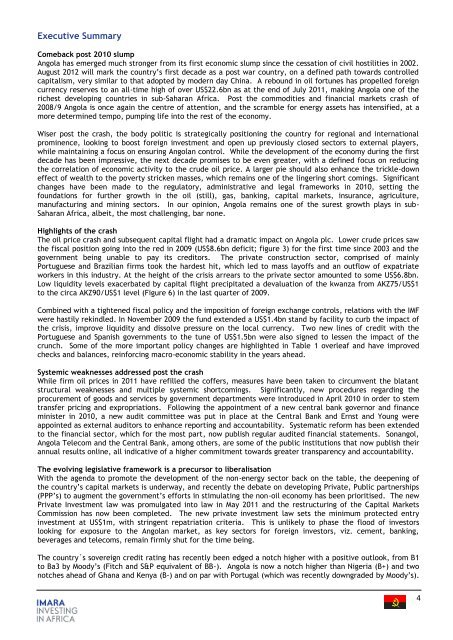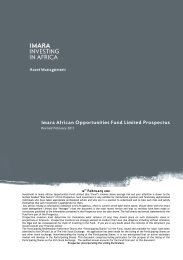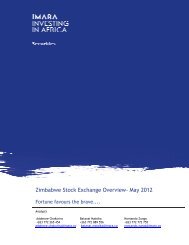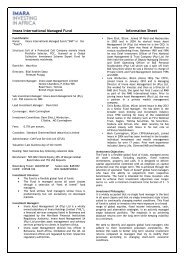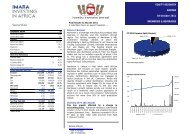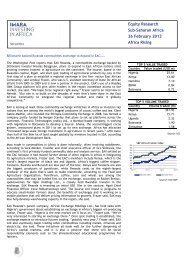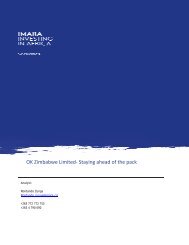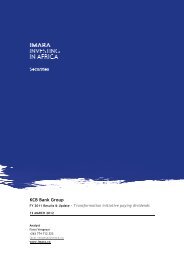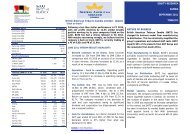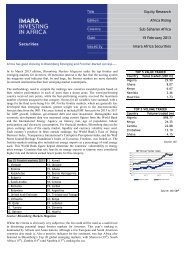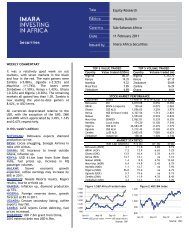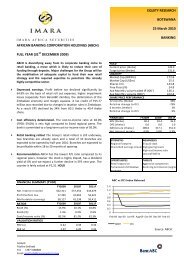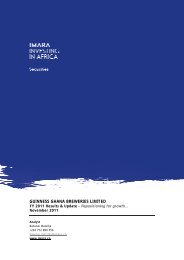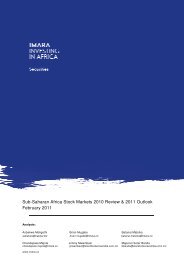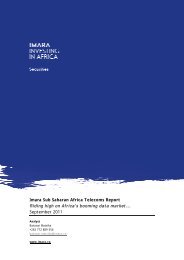Imara African Cement Report Africa, the last cement frontier Angola ...
Imara African Cement Report Africa, the last cement frontier Angola ...
Imara African Cement Report Africa, the last cement frontier Angola ...
Create successful ePaper yourself
Turn your PDF publications into a flip-book with our unique Google optimized e-Paper software.
Executive Summary<br />
Comeback post 2010 slump<br />
<strong>Angola</strong> has emerged much stronger from its first economic slump since <strong>the</strong> cessation of civil hostilities in 2002.<br />
August 2012 will mark <strong>the</strong> country‟s first decade as a post war country, on a defined path towards controlled<br />
capitalism, very similar to that adopted by modern day China. A rebound in oil fortunes has propelled foreign<br />
currency reserves to an all-time high of over US$22.6bn as at <strong>the</strong> end of July 2011, making <strong>Angola</strong> one of <strong>the</strong><br />
richest developing countries in sub-Saharan <strong>Africa</strong>. Post <strong>the</strong> commodities and financial markets crash of<br />
2008/9 <strong>Angola</strong> is once again <strong>the</strong> centre of attention, and <strong>the</strong> scramble for energy assets has intensified, at a<br />
more determined tempo, pumping life into <strong>the</strong> rest of <strong>the</strong> economy.<br />
Wiser post <strong>the</strong> crash, <strong>the</strong> body politic is strategically positioning <strong>the</strong> country for regional and international<br />
prominence, looking to boost foreign investment and open up previously closed sectors to external players,<br />
while maintaining a focus on ensuring <strong>Angola</strong>n control. While <strong>the</strong> development of <strong>the</strong> economy during <strong>the</strong> first<br />
decade has been impressive, <strong>the</strong> next decade promises to be even greater, with a defined focus on reducing<br />
<strong>the</strong> correlation of economic activity to <strong>the</strong> crude oil price. A larger pie should also enhance <strong>the</strong> trickle-down<br />
effect of wealth to <strong>the</strong> poverty stricken masses, which remains one of <strong>the</strong> lingering short comings. Significant<br />
changes have been made to <strong>the</strong> regulatory, administrative and legal frameworks in 2010, setting <strong>the</strong><br />
foundations for fur<strong>the</strong>r growth in <strong>the</strong> oil (still), gas, banking, capital markets, insurance, agriculture,<br />
manufacturing and mining sectors. In our opinion, <strong>Angola</strong> remains one of <strong>the</strong> surest growth plays in sub-<br />
Saharan <strong>Africa</strong>, albeit, <strong>the</strong> most challenging, bar none.<br />
Highlights of <strong>the</strong> crash<br />
The oil price crash and subsequent capital flight had a dramatic impact on <strong>Angola</strong> plc. Lower crude prices saw<br />
<strong>the</strong> fiscal position going into <strong>the</strong> red in 2009 (US$8.6bn deficit; figure 3) for <strong>the</strong> first time since 2003 and <strong>the</strong><br />
government being unable to pay its creditors. The private construction sector, comprised of mainly<br />
Portuguese and Brazilian firms took <strong>the</strong> hardest hit, which led to mass layoffs and an outflow of expatriate<br />
workers in this industry. At <strong>the</strong> height of <strong>the</strong> crisis arrears to <strong>the</strong> private sector amounted to some US$6.8bn.<br />
Low liquidity levels exacerbated by capital flight precipitated a devaluation of <strong>the</strong> kwanza from AKZ75/US$1<br />
to <strong>the</strong> circa AKZ90/US$1 level (Figure 6) in <strong>the</strong> <strong>last</strong> quarter of 2009.<br />
Combined with a tightened fiscal policy and <strong>the</strong> imposition of foreign exchange controls, relations with <strong>the</strong> IMF<br />
were hastily rekindled. In November 2009 <strong>the</strong> fund extended a US$1.4bn stand by facility to curb <strong>the</strong> impact of<br />
<strong>the</strong> crisis, improve liquidity and dissolve pressure on <strong>the</strong> local currency. Two new lines of credit with <strong>the</strong><br />
Portuguese and Spanish governments to <strong>the</strong> tune of US$1.5bn were also signed to lessen <strong>the</strong> impact of <strong>the</strong><br />
crunch. Some of <strong>the</strong> more important policy changes are highlighted in Table 1 overleaf and have improved<br />
checks and balances, reinforcing macro-economic stability in <strong>the</strong> years ahead.<br />
Systemic weaknesses addressed post <strong>the</strong> crash<br />
While firm oil prices in 2011 have refilled <strong>the</strong> coffers, measures have been taken to circumvent <strong>the</strong> blatant<br />
structural weaknesses and multiple systemic shortcomings. Significantly, new procedures regarding <strong>the</strong><br />
procurement of goods and services by government departments were introduced in April 2010 in order to stem<br />
transfer pricing and expropriations. Following <strong>the</strong> appointment of a new central bank governor and finance<br />
minister in 2010, a new audit committee was put in place at <strong>the</strong> Central Bank and Ernst and Young were<br />
appointed as external auditors to enhance reporting and accountability. Systematic reform has been extended<br />
to <strong>the</strong> financial sector, which for <strong>the</strong> most part, now publish regular audited financial statements. Sonangol,<br />
<strong>Angola</strong> Telecom and <strong>the</strong> Central Bank, among o<strong>the</strong>rs, are some of <strong>the</strong> public institutions that now publish <strong>the</strong>ir<br />
annual results online, all indicative of a higher commitment towards greater transparency and accountability.<br />
The evolving legislative framework is a precursor to liberalisation<br />
With <strong>the</strong> agenda to promote <strong>the</strong> development of <strong>the</strong> non-energy sector back on <strong>the</strong> table, <strong>the</strong> deepening of<br />
<strong>the</strong> country‟s capital markets is underway, and recently <strong>the</strong> debate on developing Private, Public partnerships<br />
(PPP‟s) to augment <strong>the</strong> government‟s efforts in stimulating <strong>the</strong> non-oil economy has been prioritised. The new<br />
Private Investment law was promulgated into law in May 2011 and <strong>the</strong> restructuring of <strong>the</strong> Capital Markets<br />
Commission has now been completed. The new private investment law sets <strong>the</strong> minimum protected entry<br />
investment at US$1m, with stringent repatriation criteria. This is unlikely to phase <strong>the</strong> flood of investors<br />
looking for exposure to <strong>the</strong> <strong>Angola</strong>n market, as key sectors for foreign investors, viz. <strong>cement</strong>, banking,<br />
beverages and telecoms, remain firmly shut for <strong>the</strong> time being.<br />
The country´s sovereign credit rating has recently been edged a notch higher with a positive outlook, from B1<br />
to Ba3 by Moody‟s (Fitch and S&P equivalent of BB-). <strong>Angola</strong> is now a notch higher than Nigeria (B+) and two<br />
notches ahead of Ghana and Kenya (B-) and on par with Portugal (which was recently downgraded by Moody‟s).<br />
4


